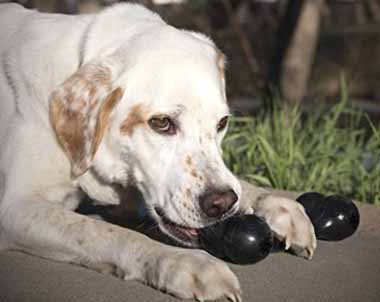Table of Contents
Summary:
"Dog chewing behavior is perfectly normal. The behavior is more pronounced for certain breeds such as Retrievers and is part of the teething process in puppies. The behavior is rewarding for dogs as it helps them discover new things and at times stay close to items with the scent of their human companion.
If you are finding this behavior destructive there are some simple things you can do to redirect this behavior."
Overview
Dog chewing is a normal behavior in dogs. Puppies chew when they are teething, up to about 12 week of age. Older dogs use their mouths to help explore the world around them.
Remember that the only way dogs have to pick something up like a human is to use the mouth.
Puppy Chewing Behavior
Young puppies are shedding their "baby" teeth (called deciduous teeth) between the ages of 4 to 8 months. Like all babies the pain from teething is helping by chewing.
Puppies also have a great deal of energy. One direction this energy takes is chewing, particularly in a dog that isn't getting enough exercise or stimulation. They may also look to spend time with items in the house that has the scent of their human companions. Chewing could be an innocent attempt to stay close to the owner.
A behavioral condition called separation anxiety might also be a cause for chewing where your dog is feeling stress when you leave the house in unpredictable patterns.
To help your puppy, create an area of the house where chewing is acceptable. Buy your dog chew toys that do not resemble items you do not want them to chew. Change the toys frequently to provide new items to explore.
Make sure that anything in the room is chew safe. For example carpeting that is frayed or peeling wallpaper will be tempting. You do not need to provide your dog with access to the entire house.
Changing Dog Chewing Behavior
It is important to provide your dog with appropriate-sized chew toys in order to prevent destructive chewing. Try as you might, however, there will probably come a time when your dog will chew your shoe or some other item. It's important to realize that he's not doing it to spite you. He may be doing it because he's bored, because he's anxious when left alone, or simply because he wants to play. If you can figure out the reason, it may help you deal with the problem.
It's also good to realize that there are ways to deal with the situation. Here are some ways to prevent unacceptable dog behavior chewing:
- If your dog shouldn't chew it, keep it out of his
reach. As he grows older and learns what is OK to chew and what isn't,
you won't have to worry so much about "doggie-proofing" your house, but
the simplest way to prevent problematic chewing is to keep valuable
items out of Fido's reach.
- If your dog is chewing furniture or
other household items while you are away, you may need to confine the
dog to one area of the house or to his crate while you are gone. Make
sure to provide plenty of toys for him to chew.
- Don't confuse your dog by giving him an old shoe to chew and then expecting him to differentiate between his shoe and yours. Make sure his toys are clearly different from household items.
- Make sure your dog has plenty of toys. Try rotating his toys so he doesn't get bored with them.
- Praise your dog whenever you see him chewing on his toys.
- Make sure your dog gets plenty of "people time". Dogs are more likely to
chew destructively if they are left alone for long periods of time.
- If you find your dog chewing on an inappropriate item, interrupt him by
saying "No!" in a firm voice. Then offer him an appropriate chew toy,
and praise him when he takes the toy in his mouth.
- Don't scold your dog for dog behavior chewing after the fact, though. He won't understand what he's being scolded for.
- Provide a Goody Toy by Kong such as the one pictured below. It will provide your dog hours of entertainment since it is a puzzle and holds dog treats.
Ask a Question or Share Your Story
Have A Dog Behavior Question or Story?
Do you have a question for our veterinarian about Dog behavior? If yes, we will answer it for free.
We will do our best to get back to you quickly (depends on how many questions we receive each day). If you do require an immediate response we suggest using this online dog veterinary service that is available now.
Sources
Destructive Chewing:
ASPCA
Jacque Lynn Schultz, CPDT
Companion Animal Programs Advisor
ASPCA National Shelter Outreach
The Humane Society of the United States

